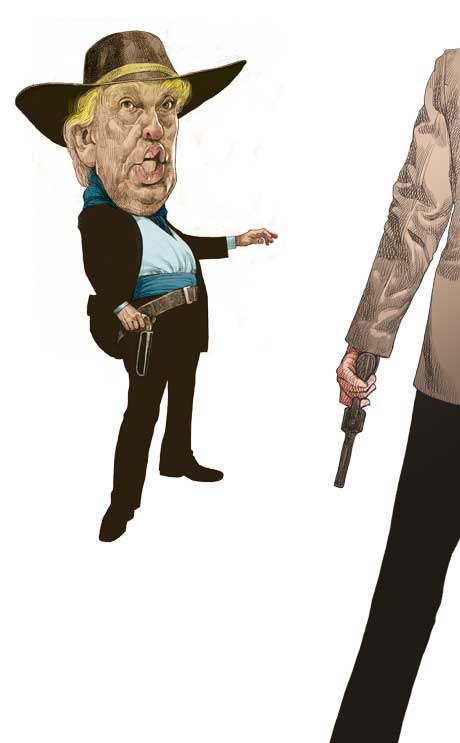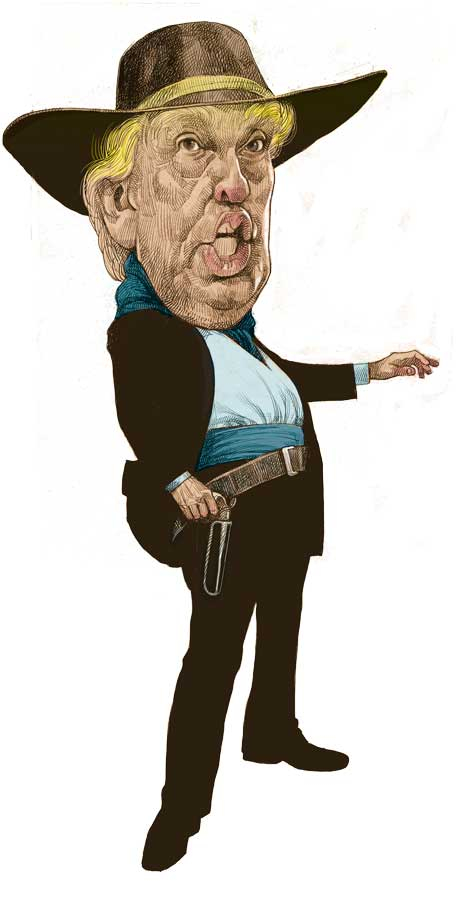The Democratic presidential field in 2020 may be even bigger than the unwieldy Republican 17-member parade in 2016. Indeed, a recent informal survey of Democratic strategists produced a list of more than 30 fellow party members who are — or who, in the minds of these insiders, should be — thinking about running for president in 2020.
Although Democrats are united in their opposition to Trump, the fundamental party cleavage runs between populists and centrists. Following is a guide to some of the potential candidates — and the political bets they’ll be making.
The B.W.H.W. candidates
Bernie Sanders, Joe Biden
A literature of alternative histories has sprung up about Democratic candidates other than Hillary Clinton who would have won in 2016. The two most popular titles in this genre? “Bernie Would Have Won” and “Biden Would Have Won.” Are they viable for 2020?
A recent poll put Bernie Sanders’s approval rating at 75 per cent, which makes him the most popular politician in America. He’s the standard-bearer for the populist left whose “Medicare for All” bill, while still a liberal pipe dream, now seems as much of a litmus test for ambitious national Democrats as abortion rights. He will also be 79 years old on Election Day 2020.
Joe Biden, a son of Scranton, Pennsylvania, appeals to the same working-class white voters who flocked to Trump in 2016. Some progressives no doubt look upon him fondly from his days as Barack Obama’s vice-president. But Biden’s three-decades-long centrist Senate record, from his handling of Clarence Thomas’s confirmation hearing in 1991 to his vote for the 2005 bankruptcy bill, might make him a tough sell to today’s Democratic primary voters, not to mention the fact that he still has those centrist tendencies (he recently came out against a universal basic income). And he’ll turn 78 in November 2020.
Would Sanders or Biden have won in 2016? We’ll never know — but it’s unlikely either will in 2020.
The party populists
Elizabeth Warren, Sherrod Brown, Jeff Merkley
As a democratic socialist, Sanders has no real allegiance to the Democratic Party; it often seems his populist movement would just as soon burn the party down. But there are other populists who are less antagonistic to the Democratic Party — not to mention who actually belong to it.
If she runs, Elizabeth Warren, a Massachusetts senator, would instantaneously be the Democrats’ putative front-runner. Her anti-corporate agenda has made her a fund-raising powerhouse, and she seems to have found an ideological sweet spot between the centrist Clinton and populist Sanders factions. Additionally, thanks to the “Nevertheless she persisted” meme, she’s become a feminist heroine.
But Warren, who’ll be 71 in 2020, is an ambivalent politician — a longtime law professor, she didn’t run for office until 2012 — and it’s not clear that she has the proverbial fire in the belly for a presidential bid.
Sherrod Brown, an Ohio senator, hails from a crucial swing state and has strong labour backing. He’s never seemed interested in a presidential run — until now. A finalist in the 2016 Democratic veepstakes, he would be formidable in Rust Belt states. His politics match the mood, and while he might not have the raw talent of Warren, he’d be a strong Plan B.
And if the populist wing is looking for a Plan C, Sen. Jeff Merkley of Oregon humbly suggests himself. He was the only senator to endorse Sanders in 2016, has been spending a fair amount of time in Iowa of late, and has become the go-to guy on Capitol Hill for liberal groups like MoveOn.
The (reluctant) establishmentarians
Cory Booker, Kirsten Gillibrand, Amy Klobuchar, Kamala Harris
Being the establishment candidate in the current political climate is the kiss of death. Which is why even candidates who fit that mold will do everything they can to avoid the label — including co-sponsoring Sanders’s Medicare for All.
Booker, a New Jersey senator, has seemingly been running for president since he was a Rhodes scholar at Oxford in the ‘90s. But some of the well-heeled backers he picked up along the way — including Big Pharma and Jared Kushner and Ivanka Trump — are now political poison in a Democratic primary. He may end up spending as much time distancing himself from his old supporters as cultivating new ones.
Gillibrand, a New York senator, is similarly well liked on Wall Street. She’s recast herself as a tough-talking liberal in recent years — introducing legislation that would institute paid family leave — but her obligations to the financial services sector will hamper her.
Klobuchar, a Minnesota senator, claimed national attention as a sort of thinking man’s Sarah Palin. A Yale and University of Chicago Law graduate, she is quick with a Fargo-accented quip. She’s burnished her liberal bona fides by becoming a reliably lefty voice, just last week teaming up with Sanders to debate health care on prime-time CNN against the most recent Republican senators trying to repeal Obamacare, Lindsey Graham and Bill Cassidy. But not that lefty. She hasn’t signed on to Medicare for All and, on CNN, spoke in favour of a bipartisan approach. What’s more, her voting record from 10 years in the Senate — including, most recently her thumbs up to a handful of Trump’s cabinet nominees — will cling to her like barnacles.
Kamala Harris, a freshman California senator, has become a liberal rock star with her tough questioning of Jeff Sessions and other Trump administration officials during Senate hearings. It’s her record as California attorney general, her previous job, that could trip her up: She declined to prosecute OneWest, the bank once headed by Treasury Secretary Steven Mnuchin, for alleged foreclosure violations. Still, Harris seems the most promising of this group — not least because she has less of a voting record her opponents can use against her.
The Clintonite
Terry McAuliffe
“Clinton” is almost as much of a risky word as “establishment.” But one candidate would proudly carry the banner of Clintonism.
Terry McAuliffe, who’ll finish his term as Virginia governor early next year, is an unapologetic friend and backer of both Clintons. He’s a famously fabulous fund-raiser and he has put together a solidly (and surprisingly) progressive record in the commonwealth — tightening gun control laws and reinstituting voting rights for more than 150,000 felons. His national stature grew during the Charlottesville protests, when he provided the sort of moral leadership so sorely lacking from the White House. “Governor Macker,” as he’s known, was once considered a punch line, so laugh at the notion of a President Macker at your own risk.
The cowboy governors
John Hickenlooper, Steve Bullock
Some Democrats will be tempted to look beyond the Beltway for a saviour. Thus the appeal of a certain type of pragmatic governor.
John Hickenlooper, in his second term as Colorado governor, has built a solid economic record there while also instituting tough gun control laws and (despite his objections) overseeing the smooth introduction of legalised marijuana. He’s also evinced a willingness for bipartisanship that has served him well in purple Colorado. He’s an offbeat enough character that it’s possible to see him catching fire.
Steve Bullock is a second-term governor in deep-red Montana, and he’d cast himself as someone who’d help Democrats broaden their electoral map beyond the coasts. It’s not a bad sales pitch. But Bullock isn’t much of a salesman. One joke making the rounds about him goes that if you close your eyes while he’s speaking, you hear Evan Bayh.
The billionaires
Mark Cuban, Howard Schultz
Suffice it to say, the events of 2016 were enough to make any billionaire think a run for the White House was suddenly plausible. And even if Facebook’s political troubles have made a Mark Zuckerberg candidacy a non-starter, 2020 is drawing the interest of a range of other rich people.
Mark Cuban, the outspoken owner of the NBA’s Dallas Mavericks, is the most similar to Trump, right down to his starring role on a reality-TV show. Howard Schultz, the founder of Starbucks, cuts a less bombastic figure, frequently denouncing partisanship.
But it’s hard to see any billionaire, even one as rabble-rousing as Cuban, faring well in a Democratic primary in 2020.
— New York Times News Service
Jason Zengerle is a contributing writer for the New York Times magazine and the political correspondent for GQ.











